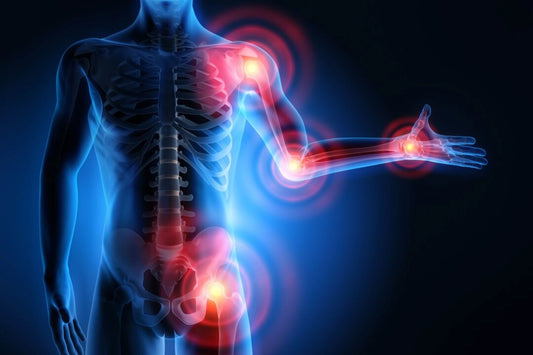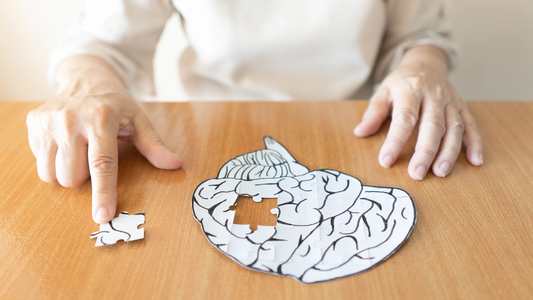Brain fog is a growing concern for many people today. Like so many other health challengestoday, more people are being affected by brain fog and its prevalence is seemingly increasing (Sukel, 2022). As humanity has been faced with rapid environmental, societal, and interpersonal changes over the last half-century, conditions like brain fog have arisen that were not even thought of or recognized during our grandparents’ or great-grandparents’ generations.
For example, people today are carrying a toxic load of synthetic compounds and other chemicals that were not present in the environment 100+ years ago (Goodrich et al., 2022), and the effects of these substances on our health are virtually unknown. It is also extremely challenging to even study and evaluate what those effects are due to so many different variables that would have to be accounted for in a clinical trial.
In addition, the way our food is grown and processed, e.g., genetic modification, fertilizer, pesticides, herbicides, and other chemical impacts, has completely changed since the middle of the 20th century (Tudi et al., 2021). These macro-level issues are affecting all of us, and it is unknown how these and others may be contributing to issues like brain fog.
What is Brain Fog?
Brain fog may be characterized by a type of brain fatigue, slow reactivity, or even mild confusion (Sukel, 2022). Brain fog could be due to a number of issues. For example, insomnia and/or poor quality sleep is known to have a negative effect on the brain’s function (Dzierzewski et al., 2017). During sleep is when we recover and regenerate from the previous day’s stress and activities.
This is an important stage in our lives for eliminating metabolic wastes and other cellular byproducts that we do not want to accumulate over time. If we are not getting proper rest and sleep, then the brain is not going to recuperate thoroughly to meet the demands of the upcoming day. Likewise, uncontrolled stress is a key contributor to health challenges, including those affecting the brain. If we do not keep our stress under control, then the brain, just like any other organ, is subjected to the effects of that, and it will leave it in a less than optimal state, potentially contributing to brain fog.
Lack of exercise has been shown to negatively affect the brain just like the rest of our body, so we should endeavor to move with consistency and intensity to avoid the bad consequences of sedentarism (McGrattan et al., 2019). Eating well and providing the brain the nutrients that it needs, like with Daily Brain Care, are also crucial for avoiding brain fog and keeping the brain at optimal performance (McGrattan et al., 2019).
What are Brain Fog Symptoms?
Do you ever feel like your head is in the clouds, meaning that you cannot focus, concentrate, or think clearly? Do you feel like you have brain fatigue, where your mind is too tired to study for that exam coming up in your biology class or you are having a hard time picking up the new skill that your boss has been teaching you to do your job better? Do you sometimes struggle with feeling like you are fully aware of your surroundings or that you are not completely participating in the moment with your family and friends? Do you feel that you are so mentally fatigued that you feel the need to sleep at an unusual time or that you are just not interested in paying attention to what is going on around you?
If you have any of these sensations or feelings, then you may have brain fog. If you struggle with sleep, manage your stress poorly, are physically inactive, and/or eat a poor diet of the typical over-processed, non-nutritive foods, then you need to make changes in your life to stop the brain fog symptoms. Try getting a good night’s sleep, taking time out to breathe deeply when you feel stressed out, going for a walk in the park, and replacing that fast food meal with a salad of vegetables, fruits, and seeds that you make at home to get you started on implementing new behaviors to eliminate brain fog.
What is a Brain Fog Test?
You can use certain tools to test if you have brain fog. Although brain fog is not a diagnosable
disease or disorder, you can utilize questionnaires to test your recall, focus, concentration, and memory to give you a better idea if you have brain fog or maybe something much more serious. To test your cognitive function most accurately, you should do that with a qualified health professional who has the knowledge and experience to make sure that the assessment is administered properly. If so, then you will have a valid assessment of your cognitive function and where you stand with brain fog.
Conclusion
Brain fog is not a diagnosable medical condition, but it is certainly annoying and can prevent you from carrying on a fulfilling life. Most of the time, the symptoms of feeling foggy, fatigued, and lacking in focus and concentration can be corrected with improving your daily habits, particularly those related to sleep, exercise, and diet/nutrition. If you make changes to your daily routine, and you still are having brain fog symptoms, then you may actually have a bigger problem that should be evaluated by your physician or other healthcare professional.
Daily Brain Care should also be a part of your regular routine to ensure that your brain is properly fed and that you are living optimally.
References
Dzierzewski JM, Dautovich N, Ravyts S. Sleep and Cognition in Older Adults. Sleep Med Clin. 2018 Mar;13(1):93-106. doi: 10.1016/j.jsmc.2017.09.009. Epub 2017 Dec 8. PMID: 29412987; PMCID: PMC5841581.
Goodrich JA, Walker D, Lin X, Wang H, Lim T, McConnell R, Conti DV, Chatzi L, Setiawan VW. Exposure to perfluoroalkyl substances and risk of hepatocellular carcinoma in a multiethnic cohort. JHEP Rep. 2022 Aug 8;4(10):100550. doi: 10.1016/j.jhepr.2022.100550. PMID: 36111068; PMCID: PMC9468464.
McGrattan AM, McGuinness B, McKinley MC, Kee F, Passmore P, Woodside JV, McEvoy CT. Diet and Inflammation in Cognitive Ageing and Alzheimer's Disease. Curr Nutr Rep. 2019 Jun;8(2):53-65. doi: 10.1007/s13668-019-0271-4. PMID: 30949921; PMCID: PMC6486891.
Sukel K. Lifting the fog. New Sci. 2022 Jun 11;254(3390):38-41. Doi: 10.1016/S0262-4079(22)01024-7. Epub 2022 Jun 10. PMID: 35722453; PMCID: PMC9187342.
Tudi M, Daniel Ruan H, Wang L, Lyu J, Sadler R, Connell D, Chu C, Phung DT. Agriculture Development, Pesticide Application and Its Impact on the Environment. Int J Environ Res Public Health. 2021 Jan 27;18(3):1112. doi: 10.3390/ijerph18031112. PMID: 33513796; PMCID: PMC7908628.




